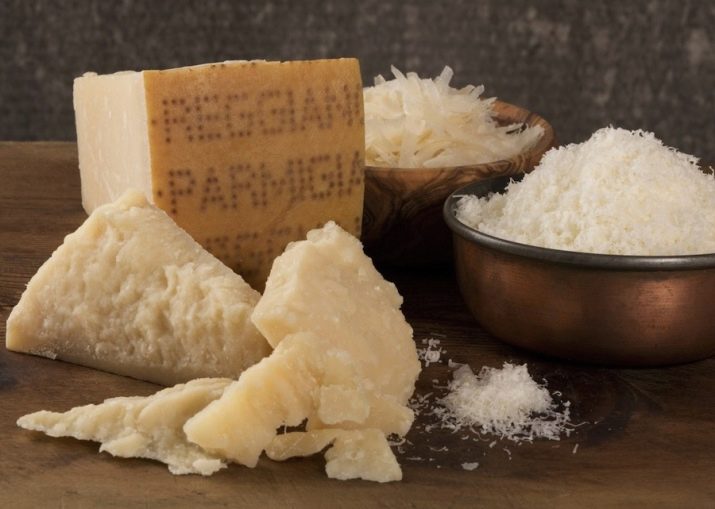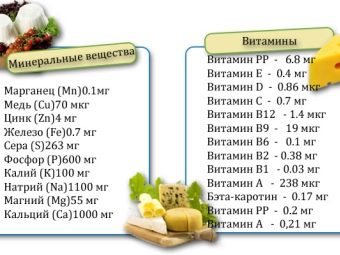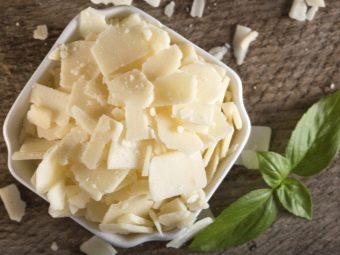Calorie content and composition of Parmesan cheese

Parmigiano Reggiano (Parmesan) is one of the most famous cheese varieties, which is made exclusively from unpasteurized cow's milk in the northern regions of Italy.This high-quality product has become a symbol of the state, which affected its stable position in the global market. Surprisingly, the method of its preparation did not change with cheese-makers for more than a few dozen centuries.
Product Feature
The energy value of 100 grams of this dairy product is about 370 calories. The composition is characterized by an excellent BJU balance: proteins - 35 g, fats - 25 g, carbohydrates - 3.5 g. In addition, there is a certain percentage of water (about 30 g) in the cheese. Parmesan cheese is a real storehouse of useful substances that can have a beneficial effect on the human body and even prevent some diseases.
The chemical value of the product is as follows:
- vitamin A (helps to improve the condition of the skin, affects the vision);
- vitamin group B: B1, B2, B4, B5, B6, B9, B12 (promotes the regeneration of muscle tissue, reducing the number of lipoproteins; normalizes metabolic processes and the amount of sugar in the blood; provides stable blood pressure; improves memory and calms the nervous system);
- vitamin d (prevents protrusion of the intervertebral disc, stops the deformation of bone tissue);
- vitamin E (supports reproductive function and connective processes of hemoglobin, eliminates increased blood clotting);
- vitamin k (cleanses the body of harmful substances that contribute to the appearance of cancer cells and liver cirrhosis);
- vitamin PP (responsible for normal blood circulation and fat metabolism, regulates the gastrointestinal tract);
- potassium and calcium (increase the elasticity and strength of the vascular walls);
- iron (it forms red blood cells, provides organs with oxygen);
- manganese (strengthens the nervous system);
- zinc (promotes the regeneration of damaged tissues);
- copper (synthesizes blood elements);
- phosphorus (strengthens the growth of hair and nails, strengthens teeth);
- magnesium (increases the protective functions of the immune system);
- selenium (maintains the state of the thyroid gland).
Of particular importance are the omega-3, 6, and 9 fatty acids contained in cheese, which can fill the entire deficiency of missing micro- and macronutrients to maintain the health of the whole organism. Parmesan also contains a special amino acid called glutamate. In other products, it exists in protein compounds. During cheese ripening, this acid enters into a strong chemical bond with sodium and water. As a result, the well-known glutamate sodium is formed.
Scientists are still arguing about the benefits and harms of this substance. But what has been proven cannot be undone: the amino acid supports brain function and improves metabolism. It is she who provides the dairy product with an excellent taste. Interestingly, the inhabitants of the East called it "mind" and "fifth taste."
Italian Parmesan will be a real salvation for people with lactose intolerance. This is because in the preparation of the cheese does not use this element, as in most dairy products. Such a product is easily absorbed by the body, without causing ailments and discomfort in the stomach.
For pregnant women, this cheese will also be useful. Available nutrients have a beneficial effect on the state of the mother, especially on her digestive system.
Before including cheese in the diet, it is better to consult a doctor to fully protect yourself and your future baby.
What is the harm of the product?
In addition to the advantages of this cheese, there are also disadvantages. However, they, fortunately, not so much. For example, an increased sodium content can adversely affect health. Experts warn that it is important to respect the dosage in obtaining this element. Sodium for a healthy adult should not exceed 2200 mg per day. The norm for people 50+, as well as those suffering from hypertension, diabetes, renal diseases is 1400 mg.
Also, contraindications for physicians include individual intolerance to natural monosodium glutamate.These cases are rare, but still worth being careful. In addition, it should be noted that due to the large amount of glutamic acid, brain processes can start abruptly, the appearance of a migraine is possible.
In general, Parmesan cheese is a valuable product. It can be included in the diet menu, without fear of recovering from the piece eaten. Low calorie content (on average, a piece contains 100 kcal) and a low carbohydrate content will not add fat to the body, but it will saturate for long hours. And adding royal cheese to various dishes as a supplement will make them tastier and more aromatic.
Review of Italian Parmesan cheese is waiting for you in the next video.























